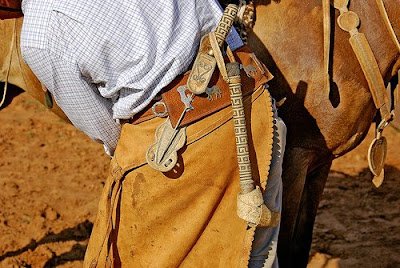What is a Facón Knife? A Look into the Argentine Tradition
The facón knife, also known as the gaucho knife, is an indispensable tool in Argentine culture and history. This traditional knife has been used for centuries by Argentine Gauchos, a class of people who lived primarily on horseback and lived off the land. The facón knife is typically long and straight with a single-edged blade that can range from 7-8 inches in length.
The shape of the blade helps to ensure that it can cut through tougher materials such as leather or hide more easily than other types of knives.
The facón knife is not only used for utilitarian purposes such as cutting meat or trimming leather, but it is also a symbol of Argentine heritage and tradition. Many legends have been passed down about this particular type of knife, which emphasizes its importance within the culture. One such legend tells of a brave Gaucho who defeated an entire regiment using only his facón knife.
In addition to its cultural significance, the facón is renowned for its craftsmanship and attention to detail. Facons are carefully forged from high-quality Stainless or carbon steel which ensures that they remain sharp and durable over time. The handles are usually made from tientos, hardwood or horn and often feature intricate carvings or designs which reflect the style of each artisan who creates them.
History of the Facón Knife
The facón knife is believed to have originated in the 19th century with the gaucho cowboys who populated the plains of Argentina. The knife was first used as a tool for herding and hunting, but soon it became an indispensable part of everyday life. It was used not only to cut meat but also for self-defense and other tasks. Over time, it became an iconic symbol of Argentine culture and heritage. The facón knife has evolved over time to become a multifunctional tool that can be used for many purposes. Initially, it was a simple one-edged blade with a wooden handle made from local materials such as cattle horns or bone. Today, however, it is typically made from stainless steel with bones, horns, wood. alpaca and tientos handles.
The facón knife has been deeply embedded in traditional Argentine culture for centuries and continues to play an important role today. It is viewed as a symbol of strength, courage, and honor which is why it is often given as a gift or reward for bravery or achievement. In addition to being used as a tool, it has also become an emblem of national pride and identity with some even referring to it as “the soul of Argentina”.
Characteristics of the Facón Knife
The facón Gaucho knife is a traditional Argentine tool that has been used for centuries as a utility, for cutting meat, and for self-defense. It is typically made with a long single-edged blade, with an exposed tang at the end of the handle. The handle is usually composed of two pieces joined together and can be made from a variety of materials such as wood, ivory, brass, leather, or horn. The blade length can vary from 7 to 11 inches and can often have decorative etchings on both sides.
Facón Gaucho knives are typically constructed from steel but other materials may also be used. Common materials include stainless steel, carbon steel and damasco steel depending on the desired strength and durability of the knife (you can learn more about the characteristics of the different materials of the blades by clicking here) Other materials like wood, ivory, brass, leather, or horn may also make up part of its construction for aesthetic purposes.
Unique Features of the Facón Knife
Some of the unique features of the facón knife include:
Blade: The primary feature that makes a facón knife stand out is its distinctive blade, which is typically between six and twelve inches long. It has a straight or slightly curved shape, with a tip that is sharpened to a point. The blade can be made from different types of steel, such as stainless steel, carbon steel, or Damascus steel.
Handle: The handle of the facón knife is usually made from hardwood or bone, although some have handles crafted with silver or gold inlay. This helps to make the knife even more comfortable and easy to use, as well as providing an attractive aesthetic design.
Sheath: A sheath for the facón is also a typical component of this type of knife. This sheath helps protect both the user and the blade, ensuring that it will remain sharp for longer periods of time without being exposed to too much wear and tear.
Versatility: The facón can be used for many different tasks including cutting meat, slicing vegetables, opening packages, and even self-defense if necessary; making it incredibly versatile in comparison to other knives on the market today.
Durable Construction: Its robust construction ensures that it can withstand tough conditions with ease and continue providing excellent performance over many years of use when maintained properly and handled with care.
Ergonomic Design: The design of this type of knife emphasizes ergonomics; allowing users to comfortably grip it while cutting during long periods without experiencing fatigue or pain in their hands despite prolonged usage.
Tradition: Last but not least, perhaps one of the most important aspects that differentiate this type of knife from others around the world is its historical significance; representing centuries-old Argentine heritage and tradition dating back hundreds of years ago until modern times.
Uses of the Facón Knife
The facón knife has a long history of serving many traditional uses in Argentina. It was initially used to butcher and prepare large game animals, such as oxen and cows, for food. The razor-sharp edge and curved handle allowed gauchos to make quick work of cutting through tough hides and muscle tissue.
This same sharpness also made it an effective weapon, which was important given the often dangerous nature of the landscape through which the gauchos were accustomed to travelling. In addition, the facon knife was historically used symbolically among the gauchos, who carried it on their backs in their leather belts to signify honour, strength and courage.
Modern Uses of the Facón Knife
Today, the facón knife is still widely used for its original purpose of preparing game meat for consumption. However, its applications have expanded significantly over time with modern improvements in the knife’s structure and materials. For example, it's been used for:
Cooking: The Facón knife is a great tool for everyday cooking, from slicing and dicing vegetables to preparing meats and other proteins. Its curved blade gives it increased leverage when cutting through tough materials, making it ideal for any task in the kitchen. Additionally, its compact size makes it easy to store and transport, making it an invaluable tool for anyone who enjoys cooking or camping outdoors.
Self-Defense: Although self-defense is not the primary use of the Facón knife, its sharp blade can be used as a deterrent against potential attackers if necessary. Its small size also makes it relatively easy to conceal on one’s person while still providing them with adequate protection should they find themselves in a dangerous situation.
Woodworking: The curved blade of the Facón knife is perfect for carving wood into decorative pieces of art or useful items such as bowls and spoons. It is a great way to hone one’s crafting skills while also creating beautiful pieces that can be enjoyed by many people.
Gardening: This traditional tool makes gardening much easier due to its curved blade which allows for more precise cuts when trimming hedges or pruning trees and bushes. Additionally, its smaller size allows for easier maneuverability when digging or planting seeds in tight spots.
Crafting Leather Goods: The Facón knife is perfect for crafting leather goods such as wallets and belts due to its sharpness which allows users to make precise cuts with minimal effort while working with this versatile material. This versatility makes it a great choice for both beginning and experienced leather crafters alike.
Hunting: Hunters have been using the Facón knife throughout Argentina’s history in order to field dress game so that they can be transported home without spoiling quickly after being taken down by hunters looking for food or sport alike. Its curved blade is perfect for skinning animals quickly and efficiently, giving hunters what they need without leaving behind too much damage on their prey’s body or hide.
The Popularity of the Facón Knife Among Argentine Gauchos
The facón knife continues to enjoy widespread popularity among Argentine gauchos even today despite the many centuries that have passed since it first became part of their culture and heritage.
In the countryside, it is very common to see rural workers wearing gaucho pants, alpargatas, a beret and on their backs, a facon knife.
The facón knife has long been an important part of Argentine history, and its use among gauchos is a testament to the resilience of this culture and tradition. Its ability to adapt to various applications while still embodying traditional values makes it an invaluable tool that will likely be passed on from generation to generation for many more years to come.
Conclusion
The facón knife is not only an important tool for gauchos but also serves as an important symbol for Argentina's rich cultural heritage. For generations, this iconic knife has provided protection and security during difficult times while also representing strength and courage among its owners. Whether you plan on using it or simply owning one as a reminder in your home or office, the facón will always have its place in Argentina's identity and history—and it will continue to be revered far into the future!
The facón knife has been an invaluable tool for gauchos since the early 19th century. It has served many purposes, from cutting meat for meals to providing a form of self-defense. The facón was also seen as a symbol of strength and courage, representing the hardworking lifestyle of these gauchos on the open field. Today, it continues to be an important part of Argentine culture, with many people owning one as a reminder of their cultural heritage.
Are You Looking for Gaucho Knives?
If you're interested in owning your own facón knife, consider shopping with a trusted source! At The Pieces of Argentina, we specialize in providing authentic Argentine Gaucho Knives—handcrafted from the finest materials and designed to last for generations. We also offer expert advice on how to properly use your knives and maintain them according to best practices. Shop with us today and show your pride in Argentine culture with a classic facón knife!
More about Gaucho Knives:
The Journey of a Gaucho Knife From Forge to Finish
The Significance of Gift-Giving Across Cultures
The Gaucho Knife: A Timeless Argentine Tradition
The Art of Gift-Giving: Exquisite Gaucho Knives for Special Occasions
Carbon Steel Gaucho Knife Blades vs Stainless Steel Knife Blades



